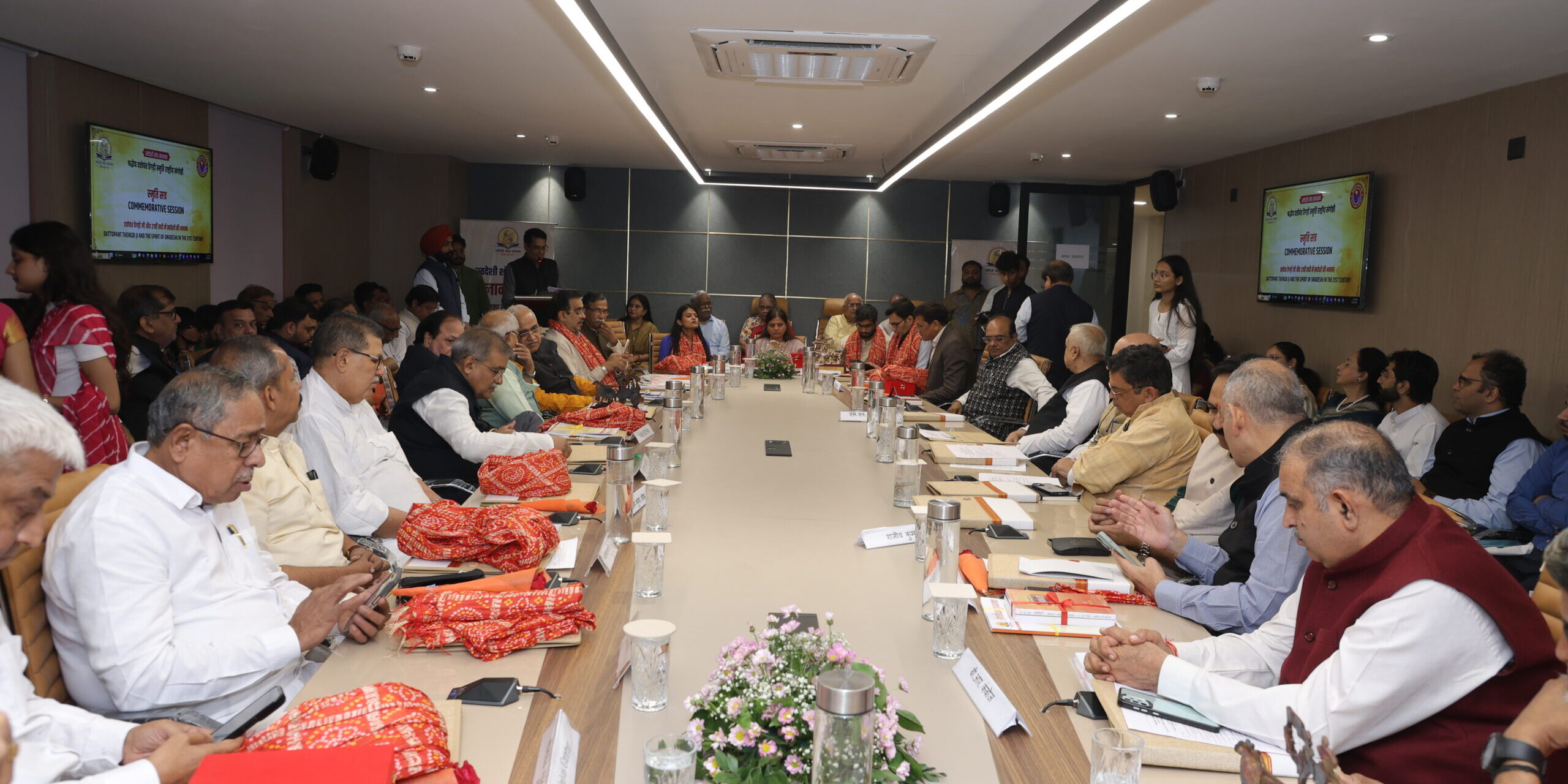Shradheya Dattopant Thengdi Commemorative National Seminar
Session 5 Report (Commemorative Session)
Inauguration of ‘Gyan Kunj’
Theme: Dattopant Thengdi Ji and the Spirit of Swadeshi in the 21st Century
Date: Nov 10, 2025
Time: 10:30 am
Venue: Gyan Kunj, New Delhi
Speakers: All invited dignitaries
Incharge: Prof. Somnath Sachdeva, Dr. Anil Sharma
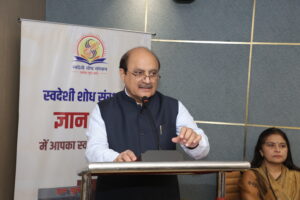 The fifth and commemorative session of the Shradheya Dattopant Thengdi Commemorative National Seminar marked the formal inauguration of Gyan Kunj, the new institutional building of the Swadeshi Shodh Sansthan in New Delhi. The session was imbued with reverence for Shradheya Dattopant Thengdi ji’s legacy and focused on advancing the spirit of Swadeshi in contemporary India.
The fifth and commemorative session of the Shradheya Dattopant Thengdi Commemorative National Seminar marked the formal inauguration of Gyan Kunj, the new institutional building of the Swadeshi Shodh Sansthan in New Delhi. The session was imbued with reverence for Shradheya Dattopant Thengdi ji’s legacy and focused on advancing the spirit of Swadeshi in contemporary India.
The program began with Prof. Pradeep Chauhan’s opening remarks, welcoming dignitaries, faculty members, and researchers. He recalled the seminar’s broader mission of Swadeshi and Viksit Bharat, paying tribute to the visionary leadership of Dattopant Thengdi ji. Prof. Chauhan also expressed gratitude to Shri S. N. Subrahmanyam, MD and CEO of L&T, for his role in constructing the Gyan Kunj premises.
Prof. Somnath Sachdeva, Vice Chancellor of Kurukshetra University, then introduced the guests of honor, highlighting Shri Subrahmanyam’s distinguished achievements and his connection to Kurukshetra University as an alumnus of NIT Kurukshetra.
Address by Shri S. N. Subrahmanyam
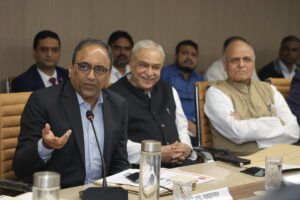 In his keynote address, Shri Subrahmanyam emphasized that India must emulate the model of self-reliant industrialization that transformed China’s economy. He underlined how domestic manufacturing, indigenous technology, and collaboration across sectors can accelerate India’s journey toward Aatmanirbharta.
In his keynote address, Shri Subrahmanyam emphasized that India must emulate the model of self-reliant industrialization that transformed China’s economy. He underlined how domestic manufacturing, indigenous technology, and collaboration across sectors can accelerate India’s journey toward Aatmanirbharta.
Highlighting Larsen & Toubro’s contributions, he noted the company’s significant involvement in defense projects, space missions, and national infrastructure development — all critical to making India stronger and more self-reliant. He expressed gratitude for being part of this occasion and envisioned Gyan Kunj as a dynamic center for Swadeshi-based innovation and knowledge creation.
Felicitations and Formal Inauguration
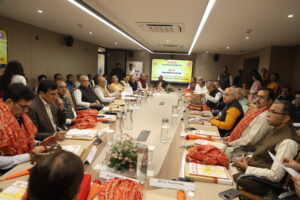 Following his address, Prof. Pradeep Chauhan extended a warm welcome to several dignitaries, including Prof. B. R. Kamboj, Smt. Jyoti Nandwana (wife of the late Shri Dinesh Nandwana), Shri Arun Kumar Ojha, Dr. Srinivas, Shri Aditya Seth, Shri Rajiv Sethia, Shri Mukesh Gupta, Shri Mukul Kanetkar, Shri Ramesh ji, Shri Ram Singh, and Shri Harishchand Mittal. He announced that one floor of the building would be named in memory of Shri Dinesh Nandwana for his foundational contributions to the Sansthan.
Following his address, Prof. Pradeep Chauhan extended a warm welcome to several dignitaries, including Prof. B. R. Kamboj, Smt. Jyoti Nandwana (wife of the late Shri Dinesh Nandwana), Shri Arun Kumar Ojha, Dr. Srinivas, Shri Aditya Seth, Shri Rajiv Sethia, Shri Mukesh Gupta, Shri Mukul Kanetkar, Shri Ramesh ji, Shri Ram Singh, and Shri Harishchand Mittal. He announced that one floor of the building would be named in memory of Shri Dinesh Nandwana for his foundational contributions to the Sansthan.
Prof. Somnath Sachdeva then digitally inaugurated Gyan Kunj and launched a documentary film on Shradheya Dattopant Thengdi ji’s life, his role in shaping the Swadeshi movement, and the continued work of Swadeshi Shodh Sansthan toward realizing his vision.
Release of Artham Arthayam Journal and Reflections
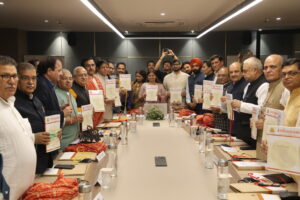 Shri Satish ji delivered a stirring discourse on Thengdi ji’s intellectual depth and leadership. He described Thengdi ji as a thinker, philosopher, and doer whose life embodied balance between ideology and action. He recalled the founding of the Swadeshi Jagran Manch in 1991 and shared personal anecdotes reflecting Thengdi ji’s resilience and moral conviction.
Shri Satish ji delivered a stirring discourse on Thengdi ji’s intellectual depth and leadership. He described Thengdi ji as a thinker, philosopher, and doer whose life embodied balance between ideology and action. He recalled the founding of the Swadeshi Jagran Manch in 1991 and shared personal anecdotes reflecting Thengdi ji’s resilience and moral conviction.
The first issue of the Sansthan’s academic journal Artham Arthayam was released, followed by a short documentary on the purpose and design of Gyan Kunj as a hub of research, dialogue, and Swadeshi intellectualism.
Roundtable Discussion: Pathways to a Developed Bharat @ 2047
The roundtable discussion that followed centered on the question, “What must India do to become a developed nation by 2047?” The discussion brought forward insights from diverse fields — agriculture, environment, economics, security, and industry — united by the underlying ethos of Swadeshi.
Shri Vijay Sethia ji initiated the dialogue by highlighting the dangers of excessive pesticide use in agriculture, linking it to public health and ecological balance. Prof. B. R. Kamboj responded by citing ongoing government and university-led farmer training programs on sustainable farming, soil testing, and scientific resource management.
On the issue of stubble burning, Prof. Kamboj shared that awareness campaigns and demonstrations are gradually shifting rural behavior toward composting and biofuel production — an encouraging step for environmental sustainability.
Shri Sanjay ji (IPS, Former DGP, Himachal Pradesh) connected Swadeshi with national security, stating that border development must be seen as an integral part of self-reliance. He praised the government’s vision of identifying border regions as “the first villages of India,” leading to new highways and infrastructural advancement along key frontiers — a fundamental change in national psychology and geography.
Shri Shrikant Mani ji emphasized that India’s population is not a burden but a vast reservoir of productive potential. Every citizen’s participation — intellectual, entrepreneurial, or manual — must be harnessed to build a truly Viksit Bharat.
Prof. Ashwini Mahajan ji analyzed Swadeshi economics within global trade contexts, observing that even developed nations practice protectionism through tariffs. He urged confidence in indigenous technology and enterprise, arguing that India’s self-belief is its greatest economic capital.
Shri Gopal Kishan ji reflected on the wisdom of Dattopant Thengdi ji, describing him as a teacher of universal nationalism who rooted economics in culture and community.
Smt. Divya Nandwana ji, daughter of the late Shri Dinesh Nandwana ji, cited her company Vertex Engineering as an example of practical Swadeshi. She explained how it became India’s sole manufacturer of ATM machines and chips, reducing import dependency and exporting to over 50 countries – proving Swadeshi’s technological relevance and global viability.
Shri Arun Kumar Ojha ji philosophically questioned what “Swadeshi” truly means, asserting that it is incomplete if ownership and profits remain foreign-controlled. Swadeshi must ensure Indian ownership, dignity of labor, and value creation within India.
Prof. Surya ji (DSE) added that reducing import dependency is essential in strategic sectors like technology and healthcare, emphasizing research-led capacity building.
CA Dhanpat Ram Agarwal ji raised concern about inequality in healthcare access and the need for systemic reform beyond urban centers, framing public health as an ethical responsibility.
Shri Bhagwati Sharma ji emphasized Swa-lamban, asserting that meaningful employment for all is vital to merging economic function with purpose. Shri Hari ji proposed that development models must be guided by nourishment, not exploitation, building equitable wealth distribution.
Concluding Reflections
In his concluding remarks, Shri S. N. Subrahmanyam returned to address the gathering, sharing a philosophical insight: “To be oneself is the essence of Swadeshi.” He urged the audience to carry forward Thengdi ji’s vision with authenticity and confidence in India’s indigenous strengths.
The commemorative session thus concluded by uniting perspectives from research, industry, governance, and grassroots activism into a shared national vision — a Swadeshi-driven, self-sustaining, and globally respected Bharat by 2047.
Gyan Kunj’s inauguration symbolized not only the expansion of infrastructure but the reaffirmation of India’s intellectual and cultural commitment to self-reliant progress, fulfilling the ideals of Shradheya Dattopant Thengdi ji.
